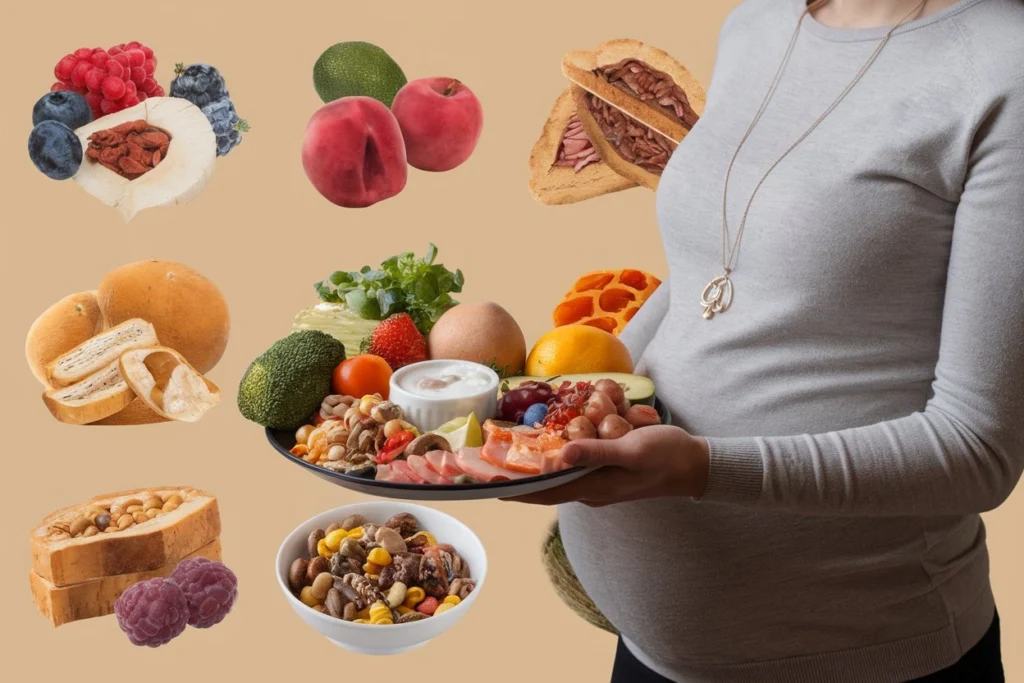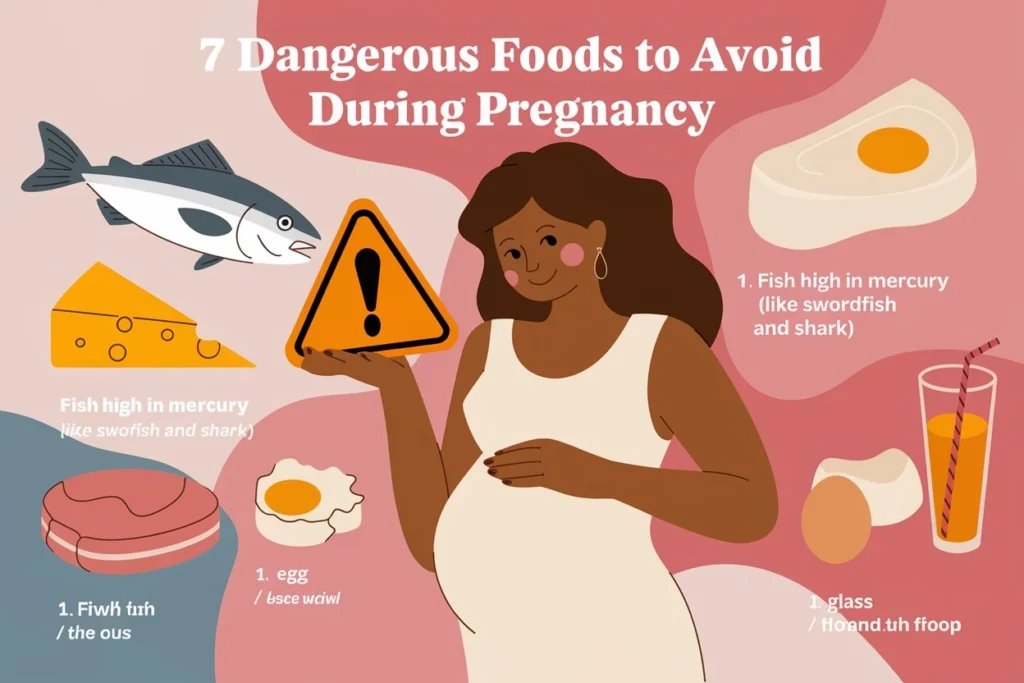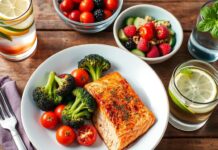Pregnancy is a special and delicate time. It is crucial for women to take good care of their diet. Some foods can pose risks to both the mother’s and the baby’s health, making it essential to avoid them for a safe pregnancy.
In this guide, we will discuss the 7 foods you should avoid. This way, you can protect your health and that of your developing baby.

Key Takeaways:
- Know which foods to avoid during pregnancy.
- Understand the risks of poor prenatal nutrition.
- Discover safe and healthy alternatives to replace risky foods.
- Focus on a balanced, nutritious diet throughout pregnancy.
- Consult with a healthcare provider for personalized advice.
Foods to Avoid During Pregnancy: A Comprehensive Guide for Moms-to-Be
When you’re expecting, paying attention to what you eat is essential. A healthy diet not only supports your well-being but also helps your baby grow and thrive. This guide covers the importance of eating safely and making smart food choices during pregnancy.
Why Safe Eating Matters During Pregnancy
Maintaining a balanced diet and avoiding risky foods is a big part of staying healthy during pregnancy. Some foods can carry harmful bacteria or toxins that could affect you or your baby. That’s why it’s so important to steer clear of raw or undercooked foods and ensure everything you eat is properly prepared.
The Risks of Poor Nutrition During Pregnancy
Eating the wrong foods during pregnancy can lead to serious issues, including:
- Foodborne illnesses: Harmful bacteria in contaminated food can cause severe complications.
- Food poisoning: This can pose risks to both you and your baby.
- Nutritional deficiencies: These can impact your baby’s development and growth.
- Higher risk of pregnancy and delivery complications.
It’s vital for moms-to-be to understand these risks and take steps to eat smart and stay healthy throughout their pregnancy.

“A balanced and safe diet is the key to a healthy pregnancy and a strong baby.”
Fish High in Mercury: Risks for Fetal Development
During pregnancy, what you eat plays a crucial role. Some types of fish contain high levels of mercury, a metal that can be harmful to your baby.
Mercury accumulates in the environment and concentrates in large fish. When a pregnant woman consumes these fish, mercury can pass to the baby, potentially impacting their growth and brain development.
It’s best to avoid fish like:
- Swordfish
- Shark
- Bluefin tuna
- Tilefish
These fish may increase the risk of birth defects, developmental delays, and cognitive problems in babies.
Safe and Nutritious Fish for Pregnancy
There are many safe fish options that are packed with nutrients beneficial for pregnancy. For example:
- Salmon
- Trout
- Cod
- Sole
These fish are rich in omega-3 fatty acids and proteins, which are essential for your baby’s development and overall health. Always choose low-mercury fish to support your baby’s growth in a safe and healthy way.
“Consuming fish during pregnancy is important, but it’s crucial to avoid those with high mercury levels to protect your baby’s health.”
Unpasteurized Dairy and Soft Cheeses: Preventing Listeriosis
During pregnancy, choosing the right foods is essential. Some items, such as unpasteurized dairy products and soft cheeses, can pose significant risks to both mother and baby. These products may carry listeria, a bacterium that can cause a severe infection called listeriosis.
Cheeses to Avoid During Pregnancy
To reduce the risk of listeriosis, avoid the following types of cheese:
- Soft cheeses like Brie, Camembert, and Roquefort
- Fresh cheeses such as ricotta and goat cheese
- Homemade or artisanal cheeses
Safe Alternatives to Unpasteurized Dairy
Thankfully, there are plenty of safe options to enjoy dairy during pregnancy:
- Pasteurized cheeses like cheddar, mozzarella, and Swiss
- Pasteurized dairy products such as milk, yogurt, and cottage cheese
- Plant-based alternatives like soy milk or almond milk
These choices allow you to benefit from the nutrients in dairy while protecting your health and your baby’s well-being. Maintaining a safe pregnancy diet is key to preventing infections like listeriosis.
Raw or Undercooked Meat: The Dangers of Toxoplasmosis
Raw or undercooked meat is another significant concern during pregnancy. It can lead to toxoplasmosis, an infection caused by the Toxoplasma gondii parasite.
Toxoplasmosis can be contracted through:
- Consuming contaminated meat
- Handling cat feces
If a pregnant woman becomes infected, the consequences for the baby can be severe, including:
- Miscarriage
- Brain damage
- Vision problems
- Developmental delays
To avoid these risks, ensure all meat is cooked thoroughly to a safe internal temperature, and practice good hygiene when handling food or cleaning up after pets.
“Toxoplasmosis is an infection that can be particularly dangerous during pregnancy, so taking preventive measures is essential.”
To Avoid These Risks: Safe Meat Preparation
Properly cooking meat to at least 71°C (160°F) is essential to kill any parasites and ensure safety during pregnancy. Additionally, avoid cured meats like cold cuts, carpaccio, and other raw or undercooked meat preparations.
While meat is an important source of protein and nutrients, there are plenty of safe alternatives, such as:
- Eggs (when properly cooked)
- Legumes
- Pasteurized dairy products
These options can help meet your nutritional needs while keeping you and your baby safe.
Raw Eggs and Homemade Mayonnaise: Risk of Salmonella
During pregnancy, it’s crucial to avoid foods that might be harmful. Raw eggs and homemade mayonnaise pose a significant risk of salmonella, which can lead to serious health issues.
Safe Ways to Enjoy Eggs During Pregnancy
To safely consume eggs, ensure they are thoroughly cooked. Avoid:
- Fried eggs with runny yolks
- Scrambled eggs that are undercooked
- Poached eggs
Instead, choose options like:
- Hard-boiled eggs
- Eggs cooked at high temperatures
- Recipes that bake or cook eggs completely.
Foods Containing Hidden Raw Eggs
In addition to plain eggs, be mindful of other foods that might include raw eggs, such as:
- Homemade mayonnaise and sauces
- Desserts or creams with raw egg
- Smoothies or shakes containing raw egg
Opt for commercially made products or safer alternatives to avoid the risk of salmonella. By taking these precautions, you can enjoy a nutritious and worry-free pregnancy.
“Food safety is crucial during pregnancy, as even small risks can have big consequences for your baby’s health.”
Caffeine and Alcohol Drinks: Effects on Baby’s Development
During pregnancy, it’s essential to avoid drinks containing caffeine and alcohol, as they can negatively impact the baby’s development. Both alcohol and caffeine can lead to issues such as growth delays and birth defects.
The Dangers of Alcohol During Pregnancy
Alcohol consumption during pregnancy can cause Fetal Alcohol Syndrome (FAS), a condition that results in physical, cognitive, and behavioral problems for the baby. Even small amounts of alcohol can be harmful, so it’s strongly recommended to avoid alcohol completely during pregnancy.
The Risks of Excessive Caffeine
Excessive caffeine intake can also pose risks during pregnancy. It can lead to:
- Growth delays
- Low birth weight
- Developmental issues
To stay safe, it is advised to limit caffeine intake to less than 200 mg per day. This means avoiding:
- Coffee
- Tea
- Cola drinks
- Chocolate
Healthier Alternatives During Pregnancy
Instead of caffeine or alcohol, opt for healthier beverages like:
- Water
- Milk
- Fruit juices
These alternatives will help you stay hydrated and provide your body with the nutrients it needs during pregnancy.
“Your baby’s well-being should be the priority during pregnancy. Protect their development by avoiding alcohol and excessive caffeine.”
A Healthy and Safe Diet is Key for Your Baby’s Growth and Development
Taking care of your nutrition during pregnancy is crucial for both your health and the well-being of your baby. A balanced and safe diet supports your baby’s growth, so make sure to follow these guidelines for a healthy pregnancy!
In conclusion, avoiding certain foods during pregnancy is vital to ensure both your health and your baby’s safety. For instance, avoid fish with high mercury content, unpasteurized dairy, raw meats, and uncooked eggs.
These foods can cause serious infections like listeriosis, toxoplasmosis, and salmonella, which can be harmful to both you and your baby. It’s best to avoid them to maintain a healthy pregnancy.
A healthy diet is essential for a safe pregnancy. Focus on eating plenty of fruits, vegetables, whole grains, and lean proteins, which will support your baby’s development.
If you’re ever unsure about what to eat, always consult your doctor for personalized advice. Your well-being during this time is important!
Avoiding certain foods is crucial for both your health and your baby’s, giving your little one a healthy start in life. Take care of yourself and your baby by following these recommendations!
FAQ
What are the main foods pregnant women should avoid?
It’s best to avoid certain foods during pregnancy. For example, fish with high mercury content, unpasteurized dairy, and soft cheeses. Raw or undercooked meats, as well as raw eggs and homemade mayonnaise, should also be avoided. Additionally, it’s advisable to refrain from consuming caffeine and alcohol.
Why is safe eating important during pregnancy?
Eating safely is crucial for the health of both the mother and the baby. Some foods may contain harmful bacteria or substances that can lead to illness or impact the baby’s development.
What are the main risks of poor prenatal nutrition?
A poor diet can lead to infections like listeriosis and toxoplasmosis. It can also result in nutritional deficiencies, developmental delays, and complications during pregnancy.
Why are fish with high mercury content dangerous during pregnancy?
Fish with high mercury levels, such as shark, can harm the baby’s development. Mercury is toxic and can pass through the placenta, affecting the baby.
What types of cheese are prohibited during pregnancy?
Soft cheeses, such as brie and camembert, are prohibited due to the risk of listeriosis, which is caused by the Listeria bacteria.
What are safe alternatives to unpasteurized dairy?
Safe alternatives include pasteurized milk, yogurt, and cheeses. These have been treated to eliminate harmful bacteria.
How should meat be properly cooked during pregnancy?
It’s important to cook meat to at least 71°C (160°F) to kill bacteria and parasites, such as Toxoplasma.
How can eggs be consumed safely during pregnancy?
Eggs should be well-cooked. Avoid eggs with runny yolks or soft centers. Also, avoid homemade mayonnaise and other dishes containing raw eggs.
What are the effects of consuming caffeine and alcohol during pregnancy?
Consuming caffeine and alcohol can be harmful. It may lead to low birth weight, growth issues, and an increased risk of birth defects. It’s recommended to avoid alcohol and limit caffeine to no more than 200 mg per day.
Main References: Drinking alcohol while pregnant – Depression in pregnancy – Illegal drugs in pregnancy


























